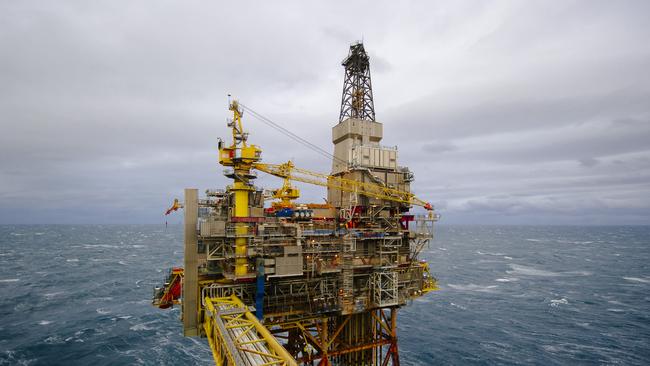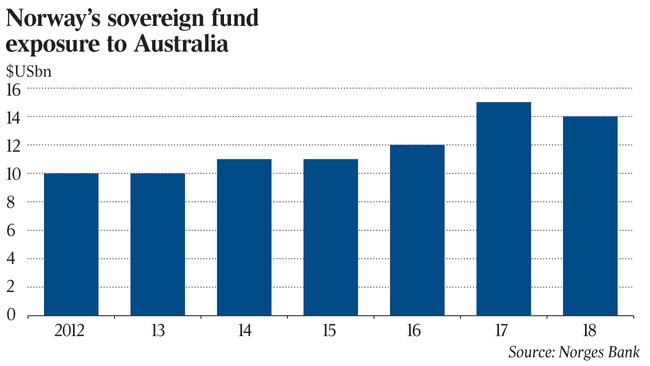Oil and gas hit as Norway exits
More than $870m worth of shares in key Australian oil and gas players are at risk as Norway’s sovereign wealth fund divests.

More than $870 million worth of shares in key Australian oil and gas players could be dumped after moves by Norway’s giant sovereign wealth fund to reduce its exposure to energy explorers and producers globally.
The vehicle, the world’s largest sovereign wealth fund with $US1 trillion ($1.42 trillion) in investments, is seeking to help the oil-dependent country avoid overreliance on permanently lower crude oil prices.
The fund announced its decision at the weekend, also calling out climate risk as an “important financial risk factor” that will have an impact on several of the companies in which it invests.
It will keep its stake in the North Sea oilfields, which are the bedrock of its wealth.
The shift is expected to put pressure on the share performance of key companies including Woodside Petroleum, Santos, Oil Search, Caltex Australia and Beach Energy, in which the Norwegian fund holds stakes worth hundreds of millions of dollars.
The proposal by Norway’s central bank, Norges Bank, reflects longer-term concerns about the direction of oil prices and the country’s exposure to exports from its North Sea fields.
A selldown by Norway’s Government Pension Fund Global could have a far-reaching impact, including on its smaller holdings on the Australian Securities Exchange, where an exit from small explorers has been recommended.
Companies affected include Australis Oil & Gas, Cooper Energy and Horizon Oil. The fund also holds interests in Karoon Energy, Liquefied Natural Gas, Senex Energy and Sundance Energy Australia marked for disposal.
The move would see the fund cut oil and gas exploration and production companies from its energy holdings, which account for about 6.2 per cent of its share portfolio.
These investments were worth about 66 billion kroner ($10.72 billion) at the end of 2018, about 1.2 per cent of the fund’s equity holdings.
Big holdings in major global oil companies, including Chevron Corp, Exxon Mobil, BP and Royal Dutch Shell, which also have billions tied up in Australia’s energy sector, will not be affected by the selldown.
Norges Bank in 2017 advised Norway’s government to exclude the oil and gas sector from the benchmark index for the sovereign fund’s investments in order to lower the risk of being tied to oil prices. An expert group determined the fund should remain invested in energy stocks.
Norway’s parliament is to discuss the plan with Norges Bank and make plans to execute the move over a “longer period”.
Australian explorers are exposed by the shift but the exclusion of global energy companies means the local oil industry is unlikely to experience disruption.
The Norwegian fund will also hold on to its 67 per cent stake in oil company Equinor, which has been embroiled in disputes about its plans to drill in The Great Australian Bight.
The shift avoids dumping companies that are switching into new energy sources including hydro, wind and solar power generation. But it may weaken trading in narrowly focused smaller explorers that are more thinly traded.

Richard Cottee, former managing director of Queensland Gas, argued the Norwegian fund’s move was mainly symbolic but could also have an impact on market sentiment: “There is a lack of particularity, which makes me err towards it being symbolism rather than having dire consequences.”
Norway said the move did not reflect a position on either oil prices or the sector’s sustainability but noted climate change was “an important risk factor” for its sovereign fund.
Senex Energy chief executive Ian Davies said the Norwegian fund had founded its fortune on oil and gas fields and was now seeking to diversify: “I don’t think it’s a statement on hydrocarbons or fossil fuels.”
Australian Petroleum Production & Exploration external affairs director Matthew Doman said the shift was about “portfolio balance rather than environmental concerns”.
However, fossil fuel divestment campaigns are broadening, with universities, local and state governments and investment groups adopting policies to exit holdings the sector. A move by Norway’s fund would be the first by a large sovereign group.
Australia’s Future Fund has defended its investment in fossil fuel companies, saying its mandate is to deliver returns from legal investments and it was not established as a “green bank”.
There is also a growing local push for greater scrutiny of energy producers.
Dr Stuart Palmer, head of ethics research at Australian Ethical, said companies were also subject to shareholder resolutions on divesting fossil fuel interests, which were attracting greater support: “I think this will add momentum to that.”
Dr Palmer said investors were engaging with companies, included integrated resources giants, in a deeper way about their fossil fuel exposures: “These conversations are becoming more sophisticated. Mainstream investors are sitting at the table, involved in those discussions.”


To join the conversation, please log in. Don't have an account? Register
Join the conversation, you are commenting as Logout